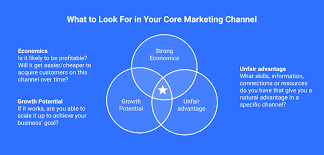Essential Startup Marketing Tips: Accelerate Your Growth
In today’s competitive business landscape, effective marketing is a crucial element for the success of any startup. It enables you to build brand awareness, attract customers, and ultimately drive revenue growth. However, with limited resources and a rapidly changing market, startups often face unique challenges when it comes to marketing. In this article, we will explore some essential startup marketing tips to help you navigate the complexities and accelerate your growth.
Define Your Target Audience: Understanding your target audience is the foundation of any successful marketing strategy. Identify your ideal customers by conducting market research, analyzing demographics, and assessing customer needs and preferences. This knowledge will help you tailor your marketing messages, choose the right channels, and effectively reach your target market.
Craft a Compelling Value Proposition: A strong value proposition communicates the unique benefits your product or service offers to customers. Clearly articulate how your solution solves their pain points and delivers value.
Your value proposition should be concise, memorable, and resonate with your target audience. Use it consistently across all marketing channels to differentiate yourself from competitors.
Build a Strong Online Presence: In the digital age, a strong online presence is paramount. Start by developing a user-friendly website optimized for search engines. Leverage content marketing to provide valuable information, engage your audience, and establish thought leadership.
Embrace social media platforms relevant to your target audience and engage with them regularly. Utilize email marketing campaigns to nurture leads and build customer relationships.
Embrace Data-Driven Marketing: Data is a powerful asset for startups. Leverage analytics tools to track and measure your marketing efforts. Monitor key performance indicators (KPIs) such as website traffic, conversion rates, and customer acquisition costs.
Analyze the data to gain insights into what is working and what needs improvement. Use this information to optimize your marketing strategies, allocate resources effectively, and drive better results.
Leverage Influencer Marketing: Influencer marketing can be a cost-effective way for startups to reach a wider audience and build credibility. Identify influencers in your industry who align with your brand values and have a significant following.
Collaborate with them to promote your product or service through sponsored content, reviews, or endorsements. Authentic influencer partnerships can generate buzz, increase brand awareness, and drive customer engagement.
Cultivate Customer Advocacy: Happy customers can be your most powerful marketing asset. Cultivate a customer-centric approach by delivering exceptional experiences and addressing customer needs promptly.
Encourage satisfied customers to share their positive experiences through testimonials, case studies, and online reviews. Word-of-mouth recommendations and referrals can have a significant impact on your startup’s growth.
Monitor and Adapt: Stay agile and responsive by monitoring market trends, competitive activities, and customer feedback. Keep a pulse on what’s happening in your industry and adapt your marketing strategies accordingly.
Continuously refine your messaging, test new channels, and optimize your campaigns based on data-driven insights. Flexibility and willingness to iterate are essential for startup marketing success.
Effective marketing is a vital component of startup success. By defining your target audience, crafting a compelling value proposition, building a strong online presence, leveraging data, embracing influencer marketing, cultivating customer advocacy, and staying adaptive, you can drive growth and create a strong brand presence.
Remember, the startup journey is an ongoing learning process, and these marketing tips will serve as a roadmap to guide you towards success.
Read Also: The Essential Guide to Startup Marketing Job Description
Lean Startup Marketing

Marketing plays a crucial role in the success of any startup, but for lean startups operating on a limited budget, it becomes even more critical to make every marketing dollar count. Lean startup marketing need to adopt smart and efficient marketing strategies that drive growth and maximize their impact without breaking the bank.
Define your target audience: Understanding your target audience is the foundation of effective marketing. Define your ideal customer profile and create buyer personas to gain insights into their needs, preferences, and pain points.
Conduct market research, engage in customer interviews, and use analytics tools to gather data. By clearly defining your target audience, you can tailor your marketing efforts to reach the right people with the right message.
Leverage content marketing: Content marketing is a cost-effective strategy that allows lean startups to establish thought leadership, build brand awareness, and engage with their audience.
Create high-quality and valuable content such as blog posts, articles, videos, infographics, and podcasts. Share your expertise, provide solutions to common challenges, and address industry trends. Distribute your content through various channels, including social media, email newsletters, and guest blogging, to expand your reach and attract potential customers.
Embrace social media marketing: Social media platforms offer powerful marketing opportunities for lean startups. Determine which platforms align with your target audience and focus your efforts there.
Develop a strong social media presence by regularly posting relevant content, engaging with your followers, and participating in industry conversations. Leverage social media advertising options, such as targeted ads and promoted posts, to amplify your reach and attract new customers. Monitor analytics to measure the effectiveness of your social media campaigns and optimize them accordingly.
Build strategic partnerships: Collaborating with complementary businesses can significantly boost your marketing efforts. Identify non-competitive companies or influencers that share your target audience and propose mutually beneficial partnerships.
This can include co-marketing campaigns, guest blogging exchanges, or joint events. By leveraging each other’s networks and resources, you can expand your reach, gain credibility, and access new customer segments.
Implement growth hacking techniques: Lean startups need to be resourceful and innovative in their marketing approach. Embrace growth hacking techniques, which focus on rapid experimentation and leveraging unconventional strategies to achieve scalable growth.
Conduct A/B testing to optimize your website and landing pages, use referral programs to incentivize customer advocacy, and leverage viral marketing techniques to create buzz around your product or service. Growth hacking allows startups to achieve significant results with minimal financial investment.
Engage in community building: Building a strong community around your brand is a powerful marketing strategy for lean startups. Engage with your customers and prospects through online forums, social media groups, and industry-specific communities.
Offer valuable insights, answer questions, and provide support. By nurturing a loyal community, you can generate word-of-mouth marketing, gain customer feedback, and establish brand advocates who will help spread the word about your startup.
Measure and iterate: One of the key principles of lean startup methodology is continuous iteration and improvement. Apply this mindset to your marketing efforts as well. Use analytics tools to track key performance indicators (KPIs) and measure the impact of your marketing campaigns.
Analyze the data, identify what is working and what needs improvement, and make data-driven decisions to optimize your marketing strategy. By constantly refining your approach, you can achieve greater efficiency and maximize the return on your marketing investment.
Marketing on a limited budget can be a challenge for lean startups, but by adopting these tips, you can make the most of your resources and drive growth effectively.
Remember to define your target audience, leverage content marketing and social media, build strategic partnerships, implement growth hacking techniques, engage in community building, and prioritize measurement and iteration. These strategies will help you maximize your marketing impact and propel your lean startup towards success.
Marketing Tips for Mobile App Startups
The mobile app industry has witnessed remarkable growth in recent years, providing ample opportunities for startups to thrive. However, the competition is fierce, with millions of apps vying for users’ attention in app stores. To succeed in this saturated market, mobile app startups must implement effective marketing strategies to increase visibility, attract users, and build a loyal customer base.
Define Your Target Audience: Before launching any marketing campaign, it is crucial to identify and understand your target audience. Determine the demographics, preferences, and needs of your potential users.
Conduct market research, analyze competitor offerings, and gather user feedback to gain valuable insights. This understanding will help you tailor your marketing efforts to resonate with your target audience effectively.
Develop a Strong Brand Identity: Create a strong brand identity that aligns with your app’s purpose and appeals to your target audience. Craft a compelling app name, design a memorable logo, and establish consistent branding across all marketing channels. A strong brand identity will not only make your app recognizable but also build trust and credibility among users.
Optimize Your App Store Presence: App store optimization (ASO) is vital for driving organic downloads. Optimize your app’s title, description, keywords, and screenshots to improve visibility in app store search results.
Use relevant keywords that users are likely to search for and ensure that your description clearly communicates the value and benefits of your app. Encourage positive user reviews and ratings, as they play a significant role in influencing potential users’ decision-making process.
Leverage Social Media Platforms: Harness the power of social media to create a buzz around your app. Identify the social media platforms where your target audience is most active and establish a strong presence there.
Develop engaging content, share updates, and interact with your followers. Collaborate with influencers and bloggers in your industry to widen your reach and gain credibility. Social media platforms also provide excellent opportunities for running targeted ad campaigns to attract new users.
Implement Content Marketing: Content marketing can help establish your app as an authoritative source and attract potential users. Create informative blog posts, videos, infographics, and podcasts related to your app’s niche.
Share valuable insights, industry trends, and tips that would interest your target audience. Optimize your content with relevant keywords to improve search engine rankings and drive organic traffic to your app’s website or landing page.
Encourage User Referrals and Reviews
Satisfied users can be your best brand ambassadors. Implement referral programs to incentivize existing users to invite their friends and family to download your app. Offer rewards, discounts, or exclusive features to both the referrer and the referred user.
Encourage users to provide feedback and reviews on app stores or through in-app prompts. Positive reviews and ratings will significantly impact your app’s reputation and influence potential users to try it out.
Utilize App Analytics: Leverage app analytics tools to gain insights into user behavior, engagement, and conversion rates. Monitor key metrics such as downloads, active users, retention rates, and in-app purchases.
Analyze the data to understand user preferences, identify areas for improvement, and refine your marketing strategies accordingly. Data-driven decision-making is crucial for optimizing user experience and maximizing app performance.
In today’s competitive mobile app landscape, effective marketing is essential for startup success. By defining your target audience, developing a strong brand identity, optimizing your app store presence, leveraging social media platforms, implementing content marketing, encouraging user referrals and reviews, and utilizing app analytics, you can drive awareness, increase downloads, and build a loyal user base.
Read Also: Dental Startup Marketing: Strategies for Success in the Modern Age
Marketing Tips for Startup Funding

Securing funding is crucial for any startup to thrive and grow. While there are various avenues to raise funds, effective marketing plays a significant role in attracting investors and showcasing the potential of your business. Here are some essential marketing tips to help you successfully raise startup funding.
Clearly communicate your value proposition: Investors receive numerous pitches every day, so it’s crucial to clearly communicate what sets your startup apart from the competition. Develop a compelling value proposition that highlights the unique problem you’re solving, your target market, and the potential for growth and profitability.
Build a strong online presence: In today’s digital age, having a strong online presence is vital for startup success. Create an engaging website that effectively conveys your brand story, showcases your products or services, and provides relevant information for potential investors. Utilize search engine optimization (SEO) techniques to ensure your website ranks well in search engine results and drives organic traffic.
Leverage social media marketing: Social media platforms provide an excellent opportunity to connect with potential investors and build brand awareness. Develop a strong presence on platforms such as LinkedIn, Twitter, and Facebook, and share compelling content that highlights your startup’s achievements, industry insights, and thought leadership. Engage with your audience and actively participate in relevant discussions and groups.
Develop a compelling pitch deck: A well-crafted pitch deck is essential when presenting your startup to potential investors. It should be concise, visually appealing, and highlight key information such as market size, revenue projections, competitive analysis, and the team’s expertise. Ensure your pitch deck clearly communicates the investment opportunity and demonstrates how the funds will be utilized to drive growth.
Leverage content marketing: Content marketing is a powerful tool for building credibility and attracting potential investors. Create informative and valuable content such as blog posts, whitepapers, case studies, and industry reports that demonstrate your expertise and showcase your startup’s unique insights. Share this content through various channels, including your website, social media platforms, and email newsletters.
Participate in industry events and conferences: Attending industry events and conferences provides an excellent opportunity to network with potential investors, industry experts, and other entrepreneurs. Consider speaking engagements or panel discussions to position yourself as a thought leader in your field. Take advantage of these events to showcase your startup, make connections, and generate interest in your business.
Engage with influencers and industry experts: Influencers and industry experts can significantly impact investor perception and help raise awareness about your startup. Identify key influencers in your industry and build relationships with them. Collaborate on content creation, seek endorsements, or invite them to be guest speakers at your events. Their support can add credibility and attract the attention of potential investors.
Develop strategic partnerships: Strategic partnerships can provide access to funding opportunities and help expand your reach. Look for potential partners who share a similar target audience or have complementary products or services. Collaborating on joint marketing initiatives, co-hosting events, or cross-promoting each other’s businesses can lead to increased visibility and investor interest.
Highlight early traction and success stories: Investors are often attracted to startups that have shown early traction and have success stories to share. Highlight key milestones, customer testimonials, and metrics that demonstrate growth potential. This evidence of market validation and customer adoption can instill confidence in potential investors.
Network and engage with the startup ecosystem: Building a strong network within the startup ecosystem can open doors to funding opportunities.
Attend startup meetups, join entrepreneurial communities, and engage with local incubators and accelerators. Participate in pitch competitions and demo days to showcase your startup to a wider audience and connect with potential investors.
Effective marketing is essential for raising startup funding. By clearly communicating your value proposition, building a strong online presence, leveraging social media marketing, developing a compelling pitch deck, leveraging content marketing, participating in industry events.
Engaging with influencers and experts, forming strategic partnerships, highlighting early traction, and networking within the startup ecosystem, you can increase your chances of attracting investors and securing the necessary funding for your startup.
Read Also: Flower Plants Complete Growing Guide




